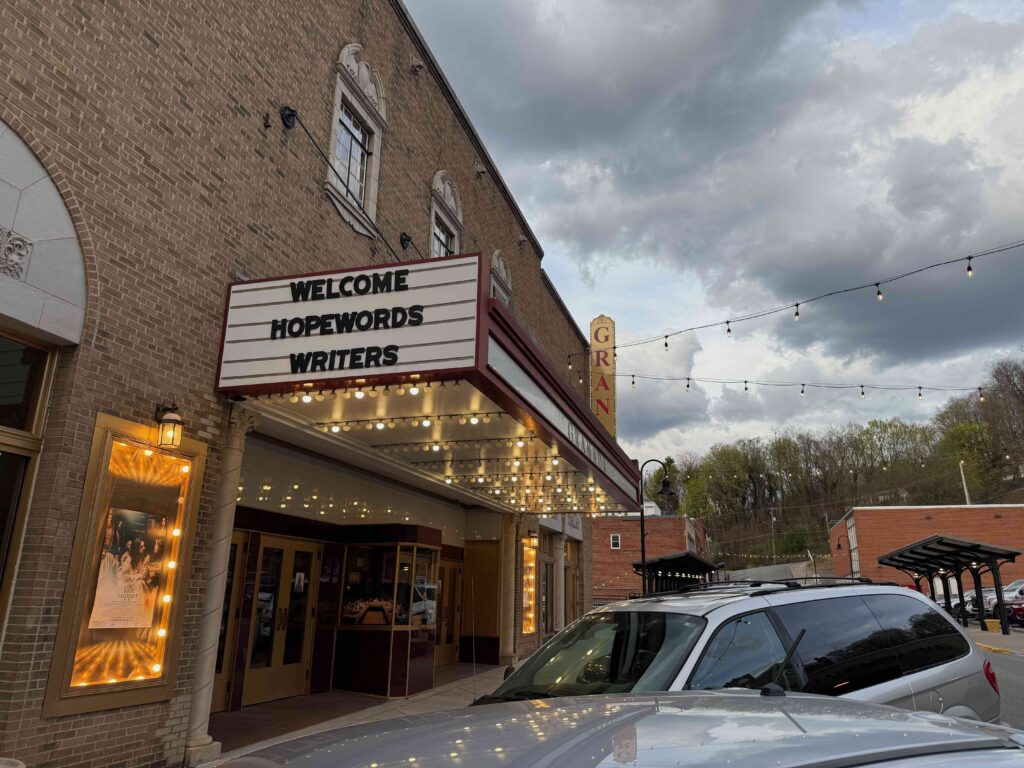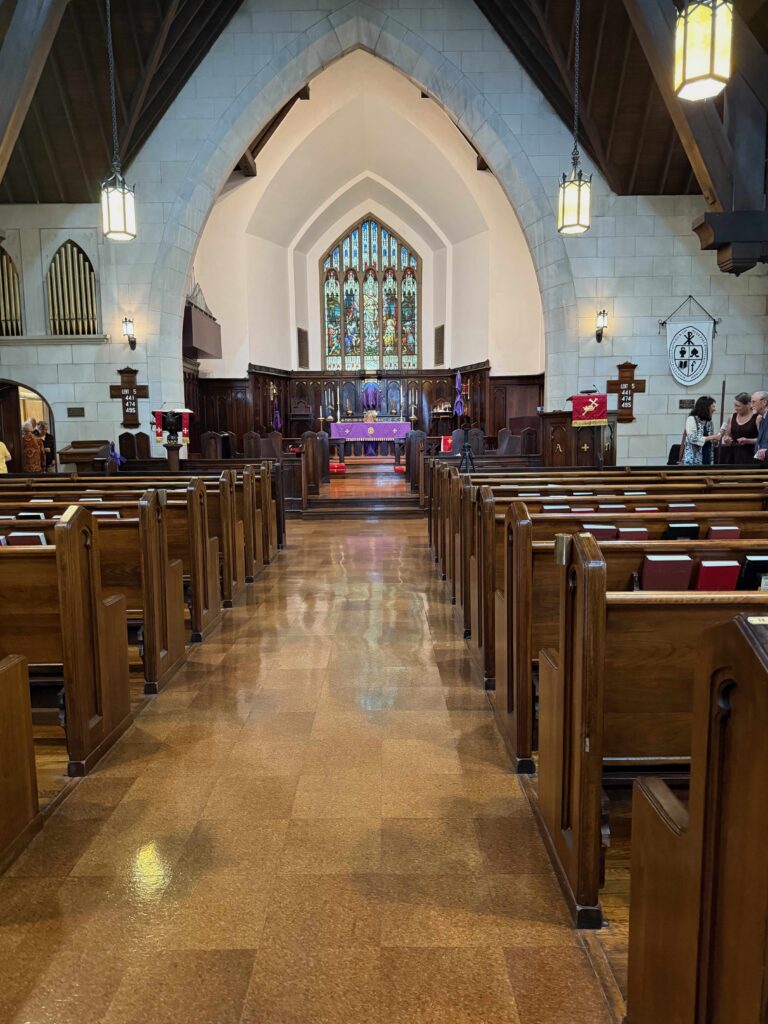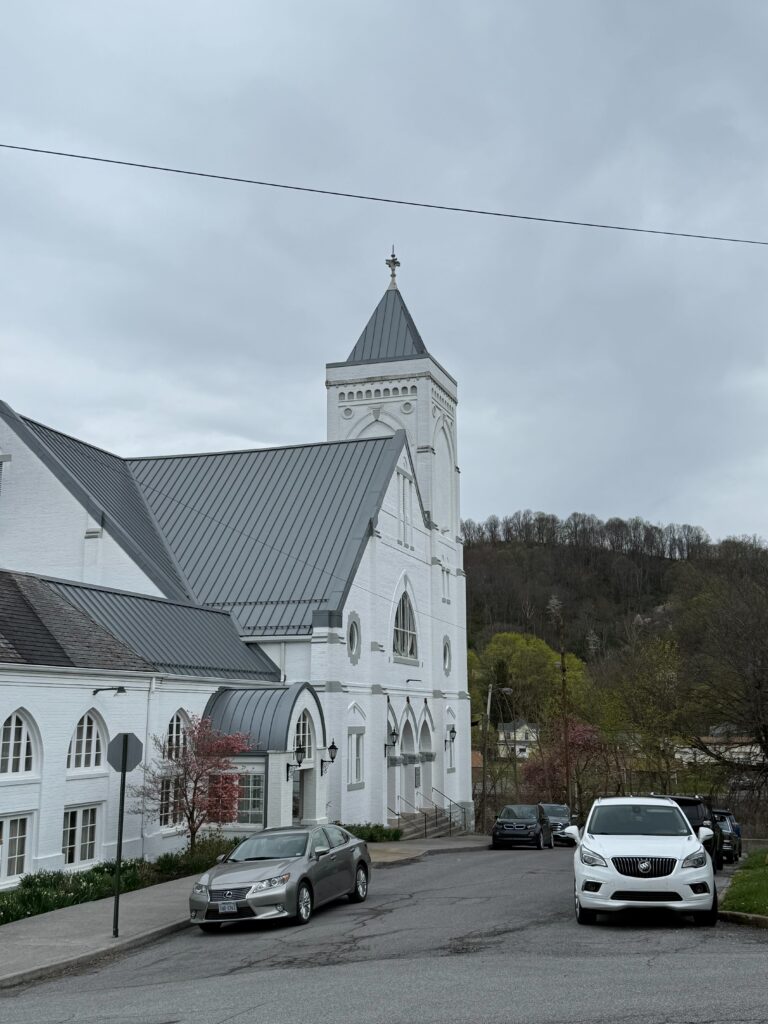
This is my third trip to Bluefield, West Virginia for the HopeWords Conference, which is held in the beautifully restored Granada Theater. This year’s theme was “Writing in the Dark.” I have also attended this conference in 2022 and 2023. Unlike the other years, probably because I wasn’t feeling well, I didn’t take many photos.
Bluefield is an interesting setting to discuss hope and writing, as the city has struggled in recent years. At one time, Bluefield was a happening place, as Travis Lowe, the founding director of HopeWords loves to tell. Lowe grew up in Bluefield and while he currently lives in Oklahoma, he still considered Bluefield home. While coal mining was just a bit west of Bluefield, the city grew as a supply point for the mines and for the railroads that served the mines. Still today, cars of coal are built up in the Bluefield rail yard to be hauled to distant locations to “make the electricity to light up the world.”
I had only two complaints about this year’s conference. Neither had anything to do with the conference and everything with my enjoyment of the event. The first had to do with the pollen count in the air. It was at an all-time high. My head pounded. I just wanted to sleep, which was hard because of sinus drainage causing me to wake as I coughed. The second was the replacement of the flooring in the hotel I stayed. In previous ones, I stayed in Princeton, about fifteen miles away, and the hotels were nicer. This time, I stayed in a Quality Inn in Bluefield, Virginia, about seven miles away. The hotel was older and will be nice once the remodeling is done, but for now is under construction.
Christian Wiman
Wiman served as the main speaker this year. The last conference I attended, in 2023, featured Miroslav Volf, a theologian from Yale. In introducing Wiman, Lowe noted that when Volf was the featured speaker, he confessed that he wasn’t worthy and recommended his colleague at Yale, Wiman. While Volf had much to add to the conference, it was a pleasure to hear Wiman, an excellent poet.
In Wiman’s opening lecture, he discussed faith and God, in contrast to religion. We only experience a fraction of God, yet we don’t have to name God for God to be God. God is always God. And our faith needs to be growing, as we put away our childhood and silly notions of the divine.
On the second day of the conference, Wiman and Lowe had a conversation. For some reason, I assumed (wrongly) that Wiman was European. He grew up in Texas, raised by parents who were first poor, then his father became a physician. He told about attending First Baptist Church in Dallas and writing a poem which first line went, “I love the Lord and He loves me.” He gave the poem to Criswell, the pastor, who had it published in the Baptist Standard. Wiman joked that his first poem was published when he was eight.
Hannah Anderson
Anderson was the first speaker on Saturday morning. This was a shame as I found her insights some of the best at the conference. Most attendees (myself included as I was five minutes late) missed the opening of her talk. Focusing on the conference theme, she spoke about a personal time of crisis (darkness) in which she felt she would never write again. She discussed the need to give herself permission to write again. She also reminded us how, in darkness, we can use other senses to experience the world. But she warned writers not to give too much artificial light into a dark situation. She closed with an essay of hers on Psalm 74, where she acknowledges that God creates light but doesn’t obliterate darkness.
I had read one of her books, Humble Roots, a few years ago. I picked up her book, All That’s Good, from the conference bookstore and recently read and reviewed it. I look forward to hearing wonderful things from my congregation about her as she’s scheduled to preach for me on June 22.
Karen Swallow Prior
This is Prior’s third appearance at HopeWords. Like Wiman, I’ve also seen her at Calvin’s Festival of Faith and Writing. She began discussing her upcoming book on “calling,” and then gave suggestions for those wanting to be writers:
1. Study language.
2. Read good words by others.
3. Seek honest feedback.
4. Writing is not the same as publishing.
5. Journal, it’s a place for you to record and work out ideas and you may have them burned after your death.
6. If you want to write to feel good about yourself, do something else. Writing is humbling.
7. Don’t write to make a living. While Prior is making money from writing, it’s only after 30 years of teaching in universities.
8. Do the writing you’re called to do.
Dr. Derwin Gray
Gray and his wife pastor Transformation Church outside of Charlotte, NC and has published several books. I am currently reading his book, How to Heal Our Racial Divide: What the Bible Says, and the First Christians Knew, About Racial Reconciliation.
As an African American, Gray attended Brigman Young University on a football scholarship. He later played five years for the Indianapolis Colts and a year for the Carolina Panthers. As he introduced himself, he joked that NFL meant, “Not For Long,” for most players only make it a few seasons. During his fifth year in Professional Football, another teammate led him to Christ. Since he retired from football, he has attended seminary and done doctoral work.
Gray began by telling his story. Much of his early years were spent in special education. He also didn’t grow up in church but, as he proclaims, “God loves to use the ordinary to do extraordinary things.” His talk resembled more of a sermon, mostly based on Psalm 23, with a lot of one-line zingers. “
“God is not a microwave. He’s more like a crockpot.”
“Our challenge: May our lives be better than our books.”
“Fight for your readers.”
“David defeated a giant but lost to lust.”
“All of life is worship.”
“Let your ink pen become a means of grace.”
and from the Roman philosopher Cicero: “The greatest form of revenge is not to become like your enemies.”
We had a long lunch hour, and I went back to the hotel and slept, causing me to miss the S. K. Smith, the afternoon’s first speaker.
Dr. Craig Keener
A professor at Asbury Theological Seminary, Dr. Craig Keener has been prolific in publishing commentaries on the Bible. While I have a decent commentary library with two or more commentaries on each book in the Bible, I have not read Keener. This cause of this oversight is that I tend to read mainly Reformed commentaries while Keener writes in the Wesleyan tradition.
Keener began his talk which he titled, “Writing Because It Matters,” with a confession. “I like writing better than speaking because you can edit before it’s public.” Most everyone laughed. He also confessed that it was because of God’s grace that he, someone diagnosed with ADHD, could become a writer.
Keener discussed his writing journey. From meeting two missionaries in high school, to his first wife leaving him, which locked him out of evangelical circles, he spoke about how writing and dealing with Scripture was forged with struggles. Fifteen years after his first wife left, he married a woman he met as a missionary in the Congo (she also has a PhD from the University of Paris). Together, they have a book, The Impossible Love.
Keener encouraged the writers in the crowd to remember that they’re not writing for themselves but for Jesus Christ.
Lewis Brogdon
Like Hannah Alexander and S. K. Smith, the last speaker on Saturday was another HopeWords regular. Lewis Brogdon, like Travis Lowe, is a native of Bluefield. He teaches homiletics at Baptist Seminary of Kentucky but also holds a part-time position at Bluefield College. Brogdon began discussing an upcoming book of his, The Gospel Beyond the Grave: Toward a Black Theology of Hope. While making the point how writing takes time, he suggested that this book had a long gestation period going back to article he read by a Catholic theologian 25 years ago. The theologian suggested that racial reconciliation would happen in purgatory. Of course, Brogdon acknowledged that as a Black Baptist, purgatory isn’t something he believes in, but the article caused him to think. Then, 23 years ago, his father died. These events, while also dealing with recent events in America, led to the book (which I will look forward to reading).
His theme was how writing can be a place of light, and he discussed how our journeys involve the work and word of God along with our own holy conversations.
Evening and Sunday morning

After the final speaker, there was free time where I went back to my hotel and napped. Then I went to an evening reception. I wasn’t hungry and a small plate of hors d’oeuvres sufficed for dinner. I had conversations with a few folks but called it an early evening and headed back to the hotel for bed around 8 PM. On Sunday morning, I attended Christ Episcopal, where Amanda Held Opelt, who’d provided music between speakers at the conference, preached. Her text was from John 12:1-8 was on Mary of Bethany, the sister of Lazarus and Martha.



Pretty sure I remember hearing the name Derwin Gray in football circles years ago. I was thinking defensive back?
I think I’ll start an annual event down here. The Pollen Festival. Our colors are green and yellow. Our mascot is phlegm.
Yep, I think he was a defensive back. Let me know how your festival goes, I think I’ll keep my distance!
I enjoy hearing about this conference. This time I’m only familiar with Prior and Gray (and Anderson following your review).
A shame about the pollen count. There’s something new (it’s always something it seems) that’s really making my eyes itch.
What do you know of Gray? I really need to read some of Karen Prior’s writings.
Sounds like you had a good time at the conference, minus the allergies and the hotel flooring. Thanks for sharing, Jeff, and I hope the pollen count is down to a more manageable level. Take care.
Yes, the pollen count has dropped, thankfully. And the conference has always been a good one.
I am not spiritual enough for this conference, but sure enjoyed it through your lens. A few take-aways–don’t give too much artificial light into a dark situation. That’s brilliant. And second– Writing is not the same as publishing. That I have to think through.
I think you’d been spiritual enough. Besides, they didn’t ask us for credentials. Had they, I might have been in trouble.